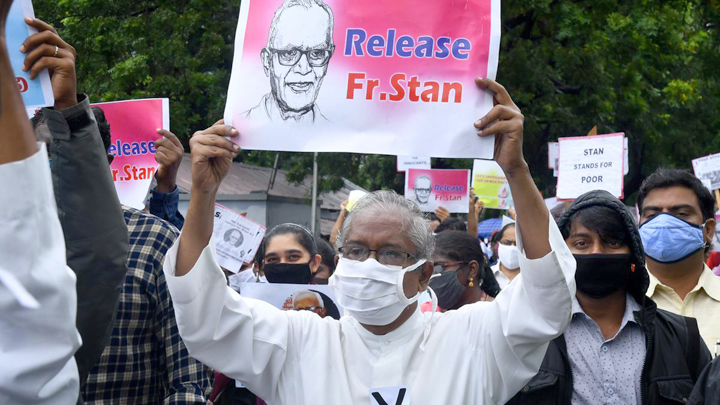Dissent has a huge price in India, say writers, who piece together the story of the imprisonment of human rights defenders including professors, lawyers, journalists and poets, without credible evidence and without trial, after being labelled as Maoist terrorists or ‘urban Naxals’
At a raid on Bagaicha, the training center and home of Jesuit priest and activist Father Stan Swamy in Ranchi, in August, 2018, the Pune police told him that he was a suspect in the Bhima Koregaon case. This shocked him, recalls Prakash Louis who has put together details of Swamy’s subsequent arrest and death in custody in a book, Fr Stan Swamy: A Maoist or A Martyr?. Swamy had never been to Bhima Koregaon nor did he have anything to do with the violence that happened on January 1, 2018, when Dalits had gathered to commemorate the 200th anniversary of the Battle of Bhima Koregaon.
“They seized my laptop, mobile and sim card, some CDs and some documents lying on my table,” he recalled. The raid was to change the octogenarian’s life. Arrested in October 2020, he was to die in judicial custody on July 5, 2021. He faced multiple accusations of involvement in the Bhima Koregaon incident besides alleged Maoist links. There were reports that Swamy was being denied basic human rights in jail, including the use of a sipper — he was suffering from Parkinson’s disease.
Louis’s book, which is being translated into many Indian languages, asks questions not just about the Bhima Koregaon arrests but the larger issue of how and why a man, whose death in judicial custody is considered by many to be an institutional murder, came to be called a Maoist in some government circles. In 2021, after his passing, The Indian Social Institute, Bengaluru, where Swamy had worked for years, published I am not a Silent Spectator, an autobiographical fragment by Stan Swamy, where he reflects on his life and work, and also his time in prison.
Arrests, and after
In her new book, Alpa Shah, professor of anthropology at the London School of Economics, provides details of arrests of activists, from Rony Wilson, Sudhir Dhawale and Surendra Gadling to Shoma Sen — who has just got bail after six years in jail without trial — and Mahesh Raut. Then came the arrests of Sudha Bharadwaj, Arun Ferreira and Vernon Gonsalves followed by those of Gautam Navlakha, Anand Teltumbde, Hany Babu and Swamy etc. In The Incarcerations: Bhima Koregaon and the Search for Democracy in India, Shah outlines how 16 human rights defenders, whom she calls the BK 16, including academics, activists, lawyers and poets, were imprisoned for years without credible evidence, and dubbed Maoist terrorists/’urban Naxals’. She goes on to write about the role of the police in hacking into the computers of at least three of the accused — Swamy, Wilson and Gadling.
Indeed, when the arrests of noted human rights defenders took place, civil society was alarmed, and some took recourse to the judiciary. The Booker Prize-winning novelist Arundhati Roy drew attention to the Emergency-like condition, stating, “In the India of today, to belong to a minority is a crime. To be murdered is a crime. To be lynched is a crime. To be poor is a crime. To defend the poor is to plot to overthrow the government.” Historian Romila Thapar went to court, stating, “Our intention was to draw the attention of the judiciary to what we see is a case of a gross misuse of the state’s power under the draconian law of the UAPA (Unlawful Activities Prevention Act).”
Two of the three Supreme Court judges rejected Prof Thapar’s petition, with a dissenting note by Justice D.Y. Chandrachud. He wrote in his judgment, “Circumstances have been drawn to our notice to cast a cloud on whether the Maharashtra Police has in the present case acted as a fair and impartial investigating agency….Liberty cannot be sacrificed at the altar of conjectures…Voices of opposition cannot be muzzled because it’s a dissent. Dissent is the safety valve of democracy. If dissent is not allowed, then the pressure cooker may burst.”
Prison diaries
The BK 16 case is bleak, but there are some moments of light in the darkness. The arrests of accomplished academics and lawyers give us an insight into the conditions of prisons besides the heart-warming ground reality of common people building bonds beyond social barriers. Recalling her days in prison, Sudha Bharadwaj penned From Phansi Yard, which brings many human stories together. The book has sketches and notes about 76 prisoners or groups of prisoners with whom Bharadwaj interacted during her time at Yerwada and Byculla jails. Through the stories of prisoners unconnected with the BK case, Bharadwaj threw light on how women helped women in prisons, that even in times of acute distress, they looked out for those in more dire circumstances.
The BK 16 case is a warning to the dangers facing Indian democracy. As Christophe Jaffrelot writes in his endorsement for Shah’s book, “A poignant biography of the Bhima Koregaon accused, Shah’s book uses this entry point to make us understand what post-democracy India is fast becoming, and how those who resist suffer — be they in jail or out.”
(Ziya Us Salam is an Indian Author, critic, journalist, social commentator)
